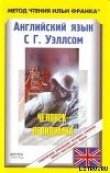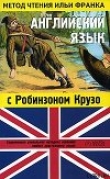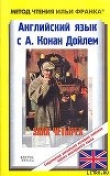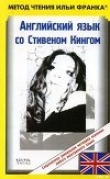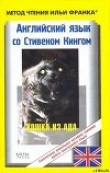
Текст книги "Английский язык с Шерлоком Холмсом. Собака Баскервилей (ASCII-IPA)"
Автор книги: Артур Конан Дойл
Соавторы: Илья Франк,Сергей Андреевский
Жанры:
Языкознание
,сообщить о нарушении
Текущая страница: 7 (всего у книги 38 страниц) [доступный отрывок для чтения: 14 страниц]
crime [kraIm], exhaust [Ig'zO:st], atmosphere ['&tm@sfI@]
«The devil's agents may be of flesh and blood, may they not? There are two questions waiting for us at the outset. The one is whether any crime has been committed at all; the second is, what is the crime and how was it committed? Of course, if Dr. Mortimer's surmise should be correct, and we are dealing with forces outside the ordinary laws of Nature, there is an end of our investigation. But we are bound to exhaust all other hypotheses before falling back upon this one. I think we'll shut that window again, if you don't mind. It is a singular thing, but I find that a concentrated atmosphere helps a concentration of thought. I have not pushed it to the length of getting into a box to think, but that is the logical outcome of my convictions. Have you turned the case over in your mind?»
"Yes, I have thought a good deal of it (да, я очень много думал над ним) in the course of the day (в течение дня)."
"What do you make of it (/и/ что вы из него поняли; to make of – понимать, постигать)?"
"It is very bewildering (оно очень запутано)."
"It has certainly a character of its own (/и/, определенно, имеет свой собственный характер = и довольно своеобразно). There are points of distinction about it (есть в нем отличительные особенности; distinction – различение; отличие). That change in the footprints, for example (те изменившиеся следы, к примеру). What do you make of that (что вы об этом думаете)?"
"Mortimer said that the man had walked on tiptoe (Мортимер сказал, что человек = сэр Чарльз шел на цыпочках) down that portion of the alley («вниз» по той части аллеи)."
"He only repeated (он только повторил /то/) what some fool had said at the inquest (что сказал какой-то болван на следствии). Why should a man walk on tiptoe down the alley (с какой стати человеку прогуливаться по аллее на цыпочках)?"
"What then (что /же/ тогда)?"
"He was running, Watson (он бежал, Ватсон) – running desperately, running for his life (бежал отчаянно, спасая свою жизнь: «бежал ради своей жизни»), running until he burst his heart (бежал, пока не разорвалось его сердце) and fell dead upon his face (и упал замертво лицом вниз: «на свое лицо»)."
character ['k&rIkt@], example [Ig'zA:mpl], dead [ded]
«Yes, I have thought a good deal of it in the course of the day.»
"What do you make of it?"
"It is very bewildering."
"It has certainly a character of its own. There are points of distinction about it. That change in the footprints, for example. What do you make of that?"
"Mortimer said that the man had walked on tiptoe down that portion of the alley."
"He only repeated what some fool had said at the inquest. Why should a man walk on tiptoe down the alley?"
"What then?"
"He was running, Watson – running desperately, running for his life, running until he burst his heart and fell dead upon his face."
"Running from what (бежал от чего)?"
"There lies our problem (здесь лежит наша задача = вот это и есть наш вопрос). There are indications that the man was crazed with fear (есть признаки, что этот человек обезумел от страха) before ever he began to run (прежде чем начал убегать)."
"How can you say that (как вы можете так говорить = откуда вам это известно)?"
"I am presuming that the cause of his fears (я считаю, что причина его страхов) came to him across the moor (приближалась к нему со /стороны/ болот). If that were so, and it seems most probable (если бы это было так, а это кажется наиболее вероятным), only a man who had lost his wits (то только человек, потерявший рассудок; to lose) would have run from the house instead of towards it (убегал бы от дома, вместо того, чтобы /бежать/ к нему). If the gipsy's evidence may be taken as true (если показания цыгана /можно/ принять за правду), he ran with cries for help in the direction (он бежал, крича о помощи в /том/ направлении; to run) where help was least likely to be (где помощь была наименее вероятна). Then, again, whom was he waiting for that night (и опять же, кого он ожидал в тот вечер), and why was he waiting for him in the Yew Alley (и почему он ждал его в тисовой аллее) rather than in his own house (а не в собственном доме; rather than – не столько… сколько)?"
"You think that he was waiting for someone (вы думаете, он кого-то ждал)?"
problem ['prObl@m], instead [In'sted], towards [t@'wO:dz]
«Running from what?»
"There lies our problem. There are indications that the man was crazed with fear before ever he began to run."
"How can you say that?"
"I am presuming that the cause of his fears came to him across the moor. If that were so, and it seems most probable, only a man who had lost his wits would have run from the house instead of towards it. If the gipsy's evidence may be taken as true, he ran with cries for help in the direction where help was least likely to be. Then, again, whom was he waiting for that night, and why was he waiting for him in the Yew Alley rather than in his own house?"
"You think that he was waiting for someone?"
"The man was elderly and infirm (человеком /он/ был пожилым и слабым /здоровьем/). We can understand his taking an evening stroll (мы можем = можно понять /его желание/ совершить вечернюю прогулку), but the ground was damp and the night inclement (но земля была сырой, а ночь – холодной; inclement – суровый /о климате/). Is it natural that he should stand for five or ten minutes (/и/ естественно ли то, что он остановился на пять или десять минут), as Dr. Mortimer, with more practical sense than I should have given him credit for (как доктор Мортимер, с более практичным рассудком, чем я в нем бы предположил; to give credit for – отдавать должное), deduced from the cigar ash (установил по сигарному пеплу)?"
"But he went out every evening (но он выходил /на прогулку/ каждый вечер)."
"I think it unlikely (я думаю, вряд ли) that he waited at the moor-gate every evening (он ждал у калитки, /ведущей на/ болота, каждый вечер). On the contrary, the evidence is (наоборот, /есть/ свидетельства) that he avoided the moor (что он избегал болот). That night he waited there (/а/ в тот вечер он ждал там). It was the night before he made his departure for London (это был вечер накануне его отъезда в Лондон; to make – делать; в сочетании с существительным означает действие, соответствующее значению существительного). The thing takes shape, Watson (дело обретает форму, Ватсон). It becomes coherent (оно становится /более/ связным). Might I ask you to hand me my violin (мог бы я попросить вас передать мне мою скрипку), and we will postpone all further thought upon this business (и мы отложим все дальнейшие размышления по этому делу) until we have had the advantage (до тех пор, пока не выудим чего-нибудь полезного; advantage – преимущество; выгода, польза) of meeting Dr. Mortimer and Sir Henry Baskerville in the morning (из утренней встречи с доктором Мортимером и сэром Генри Баскервилем)."
inclement [In'klem@nt], deduce [dI'dju:s], departure [dI'pA:tS@]
«The man was elderly and infirm. We can understand his taking an evening stroll, but the ground was damp and the night inclement. Is it natural that he should stand for five or ten minutes, as Dr. Mortimer, with more practical sense than I should have given him credit for, deduced from the cigar ash?»
"But he went out every evening."
"I think it unlikely that he waited at the moor-gate every evening. On the contrary, the evidence is that he avoided the moor. That night he waited there. It was the night before he made his departure for London. The thing takes shape, Watson. It becomes coherent. Might I ask you to hand me my violin, and we will postpone all further thought upon this business until we have had the advantage of meeting Dr. Mortimer and Sir Henry Baskerville in the morning."
CHAPTER IV. SIR HENRY BASKERVILLE
(Сэр Генри Баскервиль)
OUR breakfast-table was cleared early (мы рано позавтракали: «стол с нашим завраком был освобожден рано»; to clear – очищать; освобождать), and Holmes waited in his dressing-gown for the promised interview (и Холмс в халате ожидал назначенной встречи; promised – обещанный; interview – интервью; деловая встреча). Our clients were punctual to their appointment (наши клиенты /явились/ точно к назначенному /времени/; appointment – назначение; условленная встреча), for the clock had just struck ten when Dr. Mortimer was shown up (ибо часы как раз пробили десять, когда вошел доктор Мортимер; to show up – обнаруживать/ся/; появляться, приходить), followed by the young Baronet (в сопровождении молодого баронета: «за ним следовал молодой баронет»). The latter was a small, alert, dark-eyed man about thirty years of age (последний был невысоким, подвижным, темноглазым мужчиной лет тридцати; alert – бдительный; живой, проворный; age – возраст), very sturdily built (очень крепко сбитый; to build – строить; sturdy built – крепкий, крепкого сложения), with thick black eyebrows and a strong, pugnacious face (с густыми темными бровями и решительным, воинственным /выражением/ лица). He wore a ruddy-tinted tweed suit (на нем был: «он носил» твидовый костюм красного цвета; to wear), and had the weather-beaten appearance of one (и имел наружность человека закаленного; weather-beaten – поврежденный непогодой; видавший виды) who has spent most of his time in the open air (который большую часть времени проводит на открытом воздухе), and yet there was something in his steady eye (и все же было что-то в его твердом взгляде; eye – глаз; взор) and the quiet assurance of his bearing (и спокойной, уверенной манере держаться) which indicated the gentleman (что выдавало в нем джентльмена; to indicate – указывать; служить признаком).
"This is Sir Henry Baskerville (это сэр Генри Баскервиль)," said Dr. Mortimer.
breakfast ['brekf@st], sturdy ['st@:dI], assurance [@'Su@r(@)ns]
OUR breakfast-table was cleared early, and Holmes waited in his dressing-gown for the promised interview. Our clients were punctual to their appointment, for the clock had just struck ten when Dr. Mortimer was shown up, followed by the young Baronet. The latter was a small, alert, dark-eyed man about thirty years of age, very sturdily built, with thick black eyebrows and a strong, pugnacious face. He wore a ruddy-tinted tweed suit, and had the weather-beaten appearance of one who has spent most of his time in the open air, and yet there was something in his steady eye and the quiet assurance of his bearing which indicated the gentleman.
"This is Sir Henry Baskerville," said Dr. Mortimer.
"Why, yes (как же = он самый)," said he, "and the strange thing is, Mr. Sherlock Holmes (и удивительное в том: «и странная вещь», мистер Шерлок Холмс), that if my friend here (что если бы мой друг) had not proposed coming round to you this morning (не предложил /сегодня/ утром приехать к вам; to come round – объезжать, обходить; приезжать) I should have come on my own (я бы приехал сам). I understand that you think out little puzzles (/насколько/ я понимаю, вы разгадываете небольшие головоломки; to think out – продумать до конца; разгадать), and I've had one this morning (и у меня сегодня утром была одна) which wants more thinking out (которая требует бóльших размышлений; to want – хотеть; требовать) than I am able to give to it (чем мне по силам: «чем я способен дать ей»)."
"Pray take a seat, Sir Henry (садитесь, сэр Генри, прошу вас; to pray – молиться; умолять, просить). Do I understand you to say (правильно я вас понял, если скажу: «чтобы сказать») that you have yourself had some remarkable experience (что у вас было = с вами произошло какое-то удивительное происшествие; experience – опыт; случай, событие) since you arrived in London (с того момента: «с тех пор», как вы приехали в Лондон)?"
"Nothing of much importance, Mr. Holmes (ничего особо примечательного: «важного»). Only a joke, as like as not (очень возможно, просто шутка; as like as not = probably – возможно). It was this letter, if you can call it a letter (вот это вот письмо, если его можно назвать письмом), which reached me this morning (которое попало ко мне этим утром; to reach – протягивать /руку/; проникать, достигать)."
puzzle [pVzl], able [eIbl], since [sIns]
«Why, yes,» said he, «and the strange thing is, Mr. Sherlock Holmes, that if my friend here had not proposed coming round to you this morning I should have come on my own. I understand that you think out little puzzles, and I've had one this morning which wants more thinking out than I am able to give to it.»
"Pray take a seat, Sir Henry. Do I understand you to say that you have yourself had some remarkable experience since you arrived in London?"
"Nothing of much importance, Mr. Holmes. Only a joke, as like as not. It was this letter, if you can call it a letter, which reached me this morning."
He laid an envelope upon the table (он положил конверт на стол; to lay), and we all bent over it (и мы все склонились над ним; to bend). It was of common quality, greyish in colour (он был обычным, сероватого цвета; common quality – общее свойство). The address, «Sir Henry Baskerville, Northumberland Hotel,» (адрес – «гостиница „Нортумберленд“, сэру Генри Баскервилю») was printed in rough characters (был написан печатными буквами неровным почерком; to print – печатать; писать печатными буквами; character – характер; почерк); the post-mark «Charing Cross,» (/на/ почтовом штемпеле: «Чаринг-Кросс») and the date of posting the preceding evening (и дата отправления – предыдущий вечер).
"Who knew that you were going to the Northumberland Hotel (кто знал, что вы поедете в гостиницу «Нортумберленд»)?" asked Holmes, glancing keenly across at our visitor (спросил Холмс, бросив острый взгляд на нашего посетителя).
"No one could have known (никто не мог знать). We only decided after I met Dr. Mortimer (мы решили только после того, как встретились с доктором Мортимером; to meet)."
"But Dr. Mortimer was no doubt already stopping there (но доктор Мортимер, несомненно, уже остановился там)?"
"No, I had been staying with a friend (нет, я остановился у друга)," said the doctor. "There was no possible indication (не было никаких возможных признаков) that we intended to go to this hotel (что мы собираемся поехать в эту гостиницу)."
envelope ['envIl@up], colour ['kVl@], doctor ['dOkt@]
He laid an envelope upon the table, and we all bent over it. It was of common quality, greyish in colour. The address, «Sir Henry Baskerville, Northumberland Hotel,» was printed in rough characters; the post-mark «Charing Cross,» and the date of posting the preceding evening.
"Who knew that you were going to the Northumberland Hotel?" asked Holmes, glancing keenly across at our visitor.
"No one could have known. We only decided after I met Dr. Mortimer."
"But Dr. Mortimer was no doubt already stopping there?"
"No, I had been staying with a friend," said the doctor. "There was no possible indication that we intended to go to this hotel."
"Hum! Someone seems to be very deeply interested in your movements (хм, похоже, кто-то очень сильно интересуется вашими передвижениями; deeply – глубоко; крайне, сильно)." Out of the envelope he took a half-sheet of foolscap paper (из конверта он вынул пол-листа писчей бумаги; to take out) folded into four (сложенной вчетверо). This he opened and spread flat upon the table (развернул: «открыл» его и разгладил на столе; to spread – расстилать, развертывать; flat – плоский; ровный). Across the middle of it a single sentence (посередине /стояло/ одно-единственное предложение) had been formed by the expedient of pasting printed words upon it (составленное из печатных слов, подходяще подклеенных /друг к другу/; to form – формировать; составлять; expedient – соответствующий, подходящий). It ran (оно гласило; to run – бежать; гласить /о документе, тексте и т. п./): "as you value your life or your reason (если вы цените свою жизнь и: «или» рассудок; reason – причина, основание; рассудок) keep away from the moor (держитесь в стороне от торфяных болот)." The word «moor» only was printed in ink (только слова «торфяных болот» были написаны чернилами).
"Now," said Sir Henry Baskerville (так вот, – сказал сэр Генри Баскервиль; now – сейчас; вот /в начале предложения/), "perhaps you will tell me, Mr. Holmes (возможно, вы расскажете мне, мистер Холмс), what in thunder is the meaning of that (что, черт возьми, это значит; thunder – гром; in thunder – экспрессивное выражение /тысяча чертей, черт побери и т. д./), and who it is that takes so much interest in my affairs (и кто проявляет такой большой интерес к моим делам; to take interest – интересоваться)?"
"What do you make of it, Dr. Mortimer (что вы об этом думаете, доктор Мортимер)? You must allow (вы должны признать; to allow – позволять, разрешать; признавать) that there is nothing supernatural about this, at any rate (что здесь, во всяком случае, нет ничего сверхъестественного)?"
"No, sir, but it might very well come from someone (но это, в конце концов, могло прийти от кого-то) who was convinced that the business is supernatural (кто был убежден в том, что это дело /связано/ с мистикой)."
someone ['sVmwVn], expedient [Iks'pi:dj@nt], allow [@'lau]
«Hum! Someone seems to be very deeply interested in your movements.» Out of the envelope he took a half-sheet of foolscap paper folded into four. This he opened and spread flat upon the table. Across the middle of it a single sentence had been formed by the expedient of pasting printed words upon it. It ran: «as you value your life or your reason keep away from the moor.» The word «moor» only was printed in ink.
"Now," said Sir Henry Baskerville, "perhaps you will tell me, Mr. Holmes, what in thunder is the meaning of that, and who it is that takes so much interest in my affairs?"
"What do you make of it, Dr. Mortimer? You must allow that there is nothing supernatural about this, at any rate?"
"No, sir, but it might very well come from someone who was convinced that the business is supernatural."
«What business?» asked Sir Henry, sharply (какое дело, – резко спросил сэр Генри). "It seems to me that all you gentlemen (сдается мне, что все вы, джентльмены) know a great deal more than I do (знаете много больше, чем я) about my own affairs (о моих собственных делах)."
"You shall share our knowledge (мы поделимся с вами нашими знаниями) before you leave this room, Sir Henry (прежде чем вы покинете эту комнату, сэр Генри). I promise you that (я обещаю вам это)," said Sherlock Holmes. "We will confine ourselves for the present (а в данный момент мы ограничимся /изучением/) with your permission (с вашего позволения) to this very interesting document (этого очень интересного документа), which must have been put together and posted yesterday evening (который, должно быть, был составлен и отправлен вчера вечером; to put together – соединять; составлять, компилировать; to post – посылать по почте /брит./). Have you yesterday's Times, Watson (у вас есть вчерашняя «Таймс», Ватсон)?"
"It is here in the corner (вот здесь, в углу)."
business ['bIznIs], permission [p@'mIS(@)n], document ['dOkjument]
«What business?» asked Sir Henry, sharply. «It seems to me that all you gentlemen know a great deal more than I do about my own affairs.»
"You shall share our knowledge before you leave this room, Sir Henry. I promise you that," said Sherlock Holmes. "We will confine ourselves for the present with your permission to this very interesting document, which must have been put together and posted yesterday evening. Have you yesterday's Times, Watson?"
"It is here in the corner."
"Might I trouble you for it (/не/ мог бы я вас попросить подать ее мне: «побеспокоить из-за нее») – the inside page, please, with the leading articles (пожалуйста, внутреннюю страницу, где передовица)?" He glanced swiftly over it (он быстро просмотрел ее), running his eyes up and down the columns (пробегая глазами вверх и вниз по колонкам). "Capital article this on Free Trade (передовая: «главная» статья вот, о свободной торговле). Permit me to give you an extract from it (позвольте мне прочесть: «предложить» вам отрывок из нее). 'You may be cajoled into imagining (вас могут склонить к тому, чтобы вы вообразили) that your own special trade or your own industry (будто индивидуальная торговля или отрасль промышленности, /в которых находятся ваши интересы/; own – свой, собственный) will be encouraged by a protective tariff (будут стимулированы защитным тарифом), but it stands to reason (но совершенно очевидно) that such legislation must in the long run keep away wealth from the country (что такое законодательство должно, в конечном счете, /заставить инвесторов/ держаться в стороне от /экономики/ страны; to keep away – избегать, остерегаться; in the long run – в общем; в конце концов; wealth – богатство), diminish the value of our imports (сбавить стоимость нашего импорта; value – ценность; стоимость), and lower the general conditions of life in this island (и понизить общие условия жизни на этом острове).' What do you think of that, Watson (что вы об этом думаете, Ватсон)?" cried Holmes, in high glee (воскликнул Холмс в радостном возбуждении; high – высокий; возбужденный; glee – веселье, ликование), rubbing his hands together with satisfaction (удовлетворенно потирая руки; together – вместе; друг с другом). "Don't you think that is an admirable sentiment (не думаете ли вы = вам не кажется, что это замечательная мысль; sentiment – чувство; мнение)?"
Dr. Mortimer looked at Holmes with an air of professional interest (доктор Мортимер посмотрел на Холмса с профессиональным интересом; air – воздух; выражение лица), and Sir Henry Baskerville turned a pair of puzzled dark eyes upon me (а сэр Генри обратил ко мне пару озадаченных темных глаз).
column ['kOl@m], puzzle [pVzl], glee [gli:]
«Might I trouble you for it – the inside page, please, with the leading articles?» He glanced swiftly over it, running his eyes up and down the columns. «Capital article this on Free Trade. Permit me to give you an extract from it. 'You may be cajoled into imagining that your own special trade or your own industry will be encouraged by a protective tariff, but it stands to reason that such legislation must in the long run keep away wealth from the country, diminish the value of our imports, and lower the general conditions of life in this island.' What do you think of that, Watson?» cried Holmes, in high glee, rubbing his hands together with satisfaction. «Don't you think that is an admirable sentiment?»
Dr. Mortimer looked at Holmes with an air of professional interest, and Sir Henry Baskerville turned a pair of puzzled dark eyes upon me.
"I don't know much about the tariff (я многого не знаю о тарифах) and things of that kind," said he (и вещах подобного рода); "but it seems to me (но мне кажется) we've got a bit off the trail (мы немного отвлеклись: «сбились со следа»; to get off the trail – сбиться со следа) so far as that note is concerned (поскольку мы говорили о письме; so far as – насколько, поскольку; note – заметка; краткое письмо; to concern – касаться, иметь отношение)."
"On the contrary, I think (наоборот, я полагаю) we are particularly hot upon the trail, Sir Henry (мы как раз идем по свежему следу, сэр Генри; particularly – очень, чрезвычайно; to be hot upon the trail – идти по пятам, напасть на след). Watson here knows more about my methods than you do (вот Ватсон знает о моих методах больше, чем вы), but I fear that even he has not quite grasped the significance of this sentence (но боюсь, даже он не уловил /всю/ значимость этого предложения; to grasp – схватывать; понять, усвоить)."
"No, I confess that I see no connection (нет, сознаюсь, что не вижу /никакой/ связи)."
"And yet, my dear Watson (тем не менее, мой дорогой Ватсон), there is so very close a connection (здесь настолько тесная связь) that the one is extracted out of the other (что одно получено из другого). 'You,' 'your,' 'your,' 'life,' 'reason,' 'value,' 'keep away,' 'from the' («вы», «свою», «жизнь», «рассудок», «цените», «держитесь в стороне», «от»). Don't you see now whence these words have been taken (/и/ сейчас вы не видите, откуда взяты эти слова)?"
"By thunder, you're right (тысяча чертей, вы правы)! Well, if that isn't smart!" cried Sir Henry (ну, разве это не умно, – вскричал сэр Генри; smart – сообразительный, находчивый).
"If any possible doubt remained (если вдруг какие-то сомнения остались) it is settled by the fact (им положит конец тот факт) that 'keep away' and 'from the' are cut out in one piece (что «держитесь в стороне» и «от» вырезаны одним куском)."
"Well, now – so it is (ну вот, так и есть)!"
"Really, Mr. Holmes, this exceeds anything (по правде говоря, мистер Холмс, это превосходит все) which I could have imagined (что я мог /когда-нибудь/ себе представить)," said Dr. Mortimer, gazing at my friend in amazement (сказал доктор Мортимер, глядя на моего друга с изумлением; to amaze – изумлять, поражать). "I could understand anyone (я мог бы понять любого) saying that the words were from a newspaper (кто сказал бы, что слова из газеты); but that you should name which (но то, что вы ее назвали), and add that it came from the leading article (и добавили, что это взято из передовицы), is really one of the most remarkable things (действительно одна из наиболее примечательных вещей) which I have ever known (которые я когда-либо знал). How did you do it (как вы это сделали)?"
even ['i:v@n], significance [sIg'nIfIk@ns], exceed [Ik'si:d]
«I don't know much about the tariff and things of that kind,» said he; «but it seems to me we've got a bit off the trail so far as that note is concerned.»
"On the contrary, I think we are particularly hot upon the trail, Sir Henry. Watson here knows more about my methods than you do, but I fear that even he has not quite grasped the significance of this sentence."
"No, I confess that I see no connection."
"And yet, my dear Watson, there is so very close a connection that the one is extracted out of the other. 'You,' 'your,' 'your,' 'life,' 'reason,' 'value,' 'keep away,' 'from the.' Don't you see now whence these words have been taken?"
"By thunder, you're right! Well, if that isn't smart!" cried Sir Henry.
"If any possible doubt remained it is settled by the fact that 'keep away' and 'from the' are cut out in one piece."
"Well, now – so it is!"
"Really, Mr. Holmes, this exceeds anything which I could have imagined," said Dr. Mortimer, gazing at my friend in amazement. "I could understand anyone saying that the words were from a newspaper; but that you should name which, and add that it came from the leading article, is really one of the most remarkable things which I have ever known. How did you do it?"
"I presume, doctor, that you could tell (полагаю, доктор, вы смогли бы отличить; to tell – говорить; отличать) the skull of a negro from that of an Esquimaux (череп негра от /черепа/ эскимоса)?"
"Most certainly (несомненно)."
"But how (но как)?"
"Because that is my special hobby (потому что это мое любимое увлечение; special – особенный; любимый). The differences are obvious (различия очевидны). The supra-orbital crest (надглазничный выступ), the facial angle, the maxillary curve, the (лицевой угол, верхнечелюстная дуга…) –"
"But this is my special hobby (а это мое любимое увлечение), and the differences are equally obvious (и различия в равной степени очевидны). There is as much difference to my eyes (для моих глаз /существует/ такая же разница) between the leaded bourgeois type of a Times article (между разделенным шпонами боргесом в статье «Таймс»; lead – свинец; шпон /тонкая металлическая пластинка, служащая для увеличения промежутков между строками в наборе/) and the slovenly print of an evening halfpenny paper (и неопрятным оттиском вечерней газетенки за полпенса; paper – бумага; газета) as there could be between your negro and your Esquimaux (как /для вас/ могла бы быть между негром и эскимосом). The detection of types is one of the most elementary branches of knowledge (определение шрифтов – один из самых элементарных разделов знаний) to the special expert in crime (/необходимых/ для криминалиста), though I confess (хотя, должен признаться) that once when I was very young (однажды, когда я был очень молод) I confused the Leeds Mercury with the Western Morning News(я перепутал «Лидский Меркурий» и «Утренние известия Запада»). But a Times leader is entirely distinctive (но передовица «Таймс» совершенно отлична /от других/), and these words could have been taken from nothing else (и эти слова не могли быть взяты ниоткуда больше). As it was done yesterday (а поскольку это было сделано вчера) the strong probability was that we should find the words in yesterday's issue (была высокая степень вероятности, что мы найдем эти слова во вчерашнем выпуске; strong – сильный; значительный)."
facial ['feIS(@)l], halfpenny ['heIpnI], elementary [,elI'ment(@)rI]
«I presume, doctor, that you could tell the skull of a negro from that of an Esquimaux?»
"Most certainly."
"But how?"
"Because that is my special hobby. The differences are obvious. The supra-orbital crest, the facial angle, the maxillary curve, the –"
"But this is my special hobby, and the differences are equally obvious. There is as much difference to my eyes between the leaded bourgeois type of a Times article and the slovenly print of an evening halfpenny paper as there could be between your negro and your Esquimaux. The detection of types is one of the most elementary branches of knowledge to the special expert in crime, though I confess that once when I was very young I confused the Leeds Mercury with the Western Morning News. But a Times leader is entirely distinctive, and these words could have been taken from nothing else. As it was done yesterday the strong probability was that we should find the words in yesterday's issue."
"So far as I can follow you (насколько я могу следовать ходу ваших мыслей: «за вами»), then, Mr. Holmes," said Sir Henry Baskerville (значит, мистер Холмс, – сказал сэр Генри Баскервиль), "someone cut out this message with a scissors (кто-то вырезал это сообщение ножницами) –"
